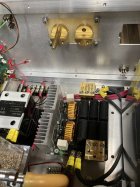itchyTF
Gold $$ Contributor
For the analog design types -
I built a Royer oscillator based induction annealer 6 or so years ago (kit from Fluxeon) but now I'm building a Gina/Eric version for a friend. People have commented that the caps get hot. The caps on my Chyna board are marked 50KHz. Is this the reason? I tried to find replacement caps that would be more suited for the 100KHz range but was unable to find anything. Any thoughts?
I plan to use the same output connection method I used on my original annealer. I added brass pads on top of the 3 standoffs to connect heavy gauge wire to the brass "connectors" on the front panel. The tubing slides through, as shown, and is clamped down on the front side. The work coil is soldered to these tubes. My concern now is skin effect. At 100KHz the depth of the conduction path is pretty thin so the center core of the stranded wire may not be carrying much (or any?). Should I use multiple lesser gauge wires or use copper sheet to make the connection? I don't really want to get into Litz wire if I can avoid it. Don't have a good way to strip the insulation off the individual strands (no solder pot).

I built a Royer oscillator based induction annealer 6 or so years ago (kit from Fluxeon) but now I'm building a Gina/Eric version for a friend. People have commented that the caps get hot. The caps on my Chyna board are marked 50KHz. Is this the reason? I tried to find replacement caps that would be more suited for the 100KHz range but was unable to find anything. Any thoughts?
I plan to use the same output connection method I used on my original annealer. I added brass pads on top of the 3 standoffs to connect heavy gauge wire to the brass "connectors" on the front panel. The tubing slides through, as shown, and is clamped down on the front side. The work coil is soldered to these tubes. My concern now is skin effect. At 100KHz the depth of the conduction path is pretty thin so the center core of the stranded wire may not be carrying much (or any?). Should I use multiple lesser gauge wires or use copper sheet to make the connection? I don't really want to get into Litz wire if I can avoid it. Don't have a good way to strip the insulation off the individual strands (no solder pot).












